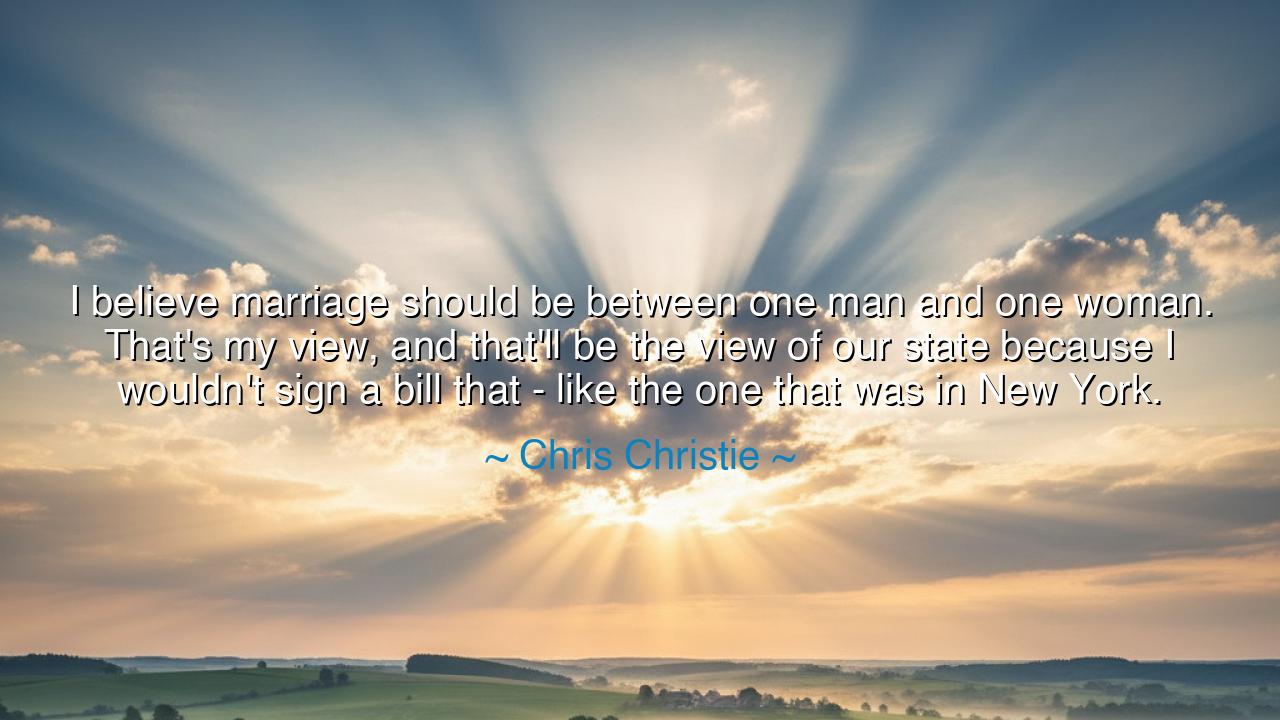
I believe marriage should be between one man and one woman.
I believe marriage should be between one man and one woman. That's my view, and that'll be the view of our state because I wouldn't sign a bill that - like the one that was in New York.






When Chris Christie declared, “I believe marriage should be between one man and one woman. That's my view, and that'll be the view of our state because I wouldn't sign a bill that—like the one that was in New York,” he spoke not merely as a politician defending a policy, but as a man standing upon the ancient foundation of tradition. His words carry the weight of conviction—a belief that marriage, in its truest form, is not simply a social arrangement, but a sacred covenant rooted in the natural and moral order of creation. In this declaration, we hear not just the voice of a governor, but the echo of civilizations that have, for millennia, understood marriage as the cornerstone of both family and society.
The meaning of his statement lies in the tension between belief and governance, between the enduring laws of tradition and the shifting tides of modern thought. Christie’s view is one shaped by faith, by history, and by the idea that some truths—though challenged—remain unbroken. In saying “I believe,” he speaks from conscience, affirming that belief itself is not a weapon but a boundary, a compass by which one navigates moral complexity. His words remind us that a leader must sometimes stand alone, defending what he perceives as eternal, even when the winds of time demand surrender.
To understand the origin of such conviction, one must look deeper than politics and into the human story of marriage itself. Since the dawn of civilization, marriage between man and woman has been the vessel through which life is renewed and culture preserved. In every ancient text—from the Vedas of India to the scriptures of Israel—the union of the sexes is seen as a sacred joining of opposites: strength and gentleness, reason and nurture, body and soul. From this union springs not only the next generation, but also the moral and emotional stability upon which every tribe, village, and kingdom has depended. Christie’s defense of this structure, then, is not the defense of custom alone, but of continuity—the belief that by preserving the old flame, one keeps the hearth of civilization burning.
Yet to hold such a belief in a changing world requires courage. The modern age has questioned, redefined, and in many places abandoned the traditional view of marriage. In this climate, Christie’s stance reflects the ancient struggle between conviction and conformity. Like Socrates before his judges, he stands by what he perceives as truth, knowing that truth is not measured by popularity. For to abandon conviction for comfort is to betray the self. Whether one agrees or disagrees with him, his declaration serves as a reminder that belief is the armor of integrity, and that to lead with conscience is rarer, and perhaps more noble, than to lead with applause.
History gives us many examples of those who stood for their beliefs when the world turned against them. Consider Sir Thomas More, who refused to yield his conscience to King Henry VIII’s demands to redefine marriage for personal gain. When the king sought to sever his union with Catherine and wed another, More chose principle over life itself, saying, “I die the King’s good servant, but God’s first.” Like Christie’s, his belief was rooted not in stubbornness but in the sacredness of the marital bond as ordained, not invented. His death became a symbol of fidelity—to truth, to conscience, and to the order that binds heaven to earth.
Still, we must listen with both heart and wisdom. Christie’s words, though firm, also reveal the burden of belief—that every conviction must coexist with compassion. To hold a view is not to despise those who differ; it is to live by one’s understanding of the good, while honoring the humanity of all. The ancients taught that virtue lies not in the extremity of action but in the balance of justice and mercy. Thus, even as one defends the sacred, one must remember the sacredness of every soul. The challenge of our time is to speak truth without cruelty, to uphold conviction without contempt.
The lesson in Christie’s quote reaches beyond the politics of marriage and into the realm of the soul: hold fast to your beliefs, but hold them with humility. In every generation, the world will test what we stand for. Some will yield for peace; others will stand for principle. The wise, however, learn to defend what is eternal while remaining kind to what is human. For no law or decree can sanctify the heart if the heart itself forgets to love.
So, my child, remember this teaching: conviction without compassion becomes stone, but compassion without conviction becomes sand. Stand, as Chris Christie stood, upon what you believe to be true—but temper it with gentleness, lest righteousness harden into pride. The ancients knew that strength and love must walk together, as man and woman do, in the eternal dance of creation. And in that balance, the world finds not only its laws, but its soul.






AAdministratorAdministrator
Welcome, honored guests. Please leave a comment, we will respond soon